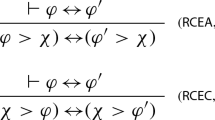Abstract
Writers such as Stalnaker and Dummett have argued that specific features of subjunctive conditional statements undermine the principle of bivalence. This, paper is concerned with rebutting such claims. 1. It is shown how subjective conditionals pose a prima facie threat to bivalence, and how this threat can be dissolved by a distinction between the results of negating a subjective conditional and of negating its consequent. To make this distinction is to side with Lewis against Stalnaker in a dispute about possible worlds semantics for such conditionals, and reasons are given for doing so. 2. These arguments are extended to answer Dummett's claim that behaviourist and phenomenalist analyses in terms of subjunctive conditions violate bivalence. This answer is shown to be compatible with the principle that hypothetical statements are true only in virtue of categorical facts.
Similar content being viewed by others
References
Dummett, M. A. E.: 1959, ‘Truth’, reprinted in Dummett (1978).
Dummett, M. A. E.: 1963, ‘Realism’, in Dummett (1978).
Dummett, M. A. E.: 1973, ‘The Philosophical Basis of Intuitionistic Logic’, reprinted in Dummett (1978).
Dummett, M. A. E.: 1977,Elements of Intuitionism, University Press, Oxford.
Dummett, M. A. E.: 1978,Truth and Other Enigmas, Duckworth, London.
Dummett, M. A. E.: 1982, ‘Realism’,Synthese 52, 55–112.
Gärdenfors, P.: 1981, ‘An Epistemic Approach to Conditionals’,American Philosophical Quarterly 18, 203–11.
Gärdenfors, P.: 1984, ‘Epistemic Importance and Minimal Changes of Belief’,Australosian Journal of Philosophy 62, 136–57.
Goodman, N.: 1946, ‘The Problem of Counterfactual Conditionals’, inFact, Fiction and Forecast (3rd ed.), Harvester, Sussex.
Lewis, D. K.: 1973,Counterfactuals, Blackwell, Oxford.
Mellor, D. H.: 1974, ‘In Defence of Dispositions’,Philosophical Review 83, 157–81.
Peacocke, C. A. B.: 1980, ‘Causal Modalities and Realism’, in M. de B. Platts (ed.),Reference, Truth and Reality, Routledge, London.
Quine, W. V. O.: 1952,Methods of Logic, Routledge, London.
Stalnaker, R. C.: 1968, ‘A Theory of Conditionals’, reprinted in E. Sosa (ed.),Causation and Conditionals, University Press, Oxford.
Stalnaker, R. C.: 1981, ‘A Defence of Conditional Excluded Middle’, in W. L. Harper, R. Stalnaker and G. Pearce (eds.),Ifs: Conditionals, Belief, Decision, Chance and Time, Reidel, Dordrecht.
Stalnaker, R. C.: 1984,Inquiry, MIT, Cambridge.
Van Fraassen, B. C.: 1974, ‘Hidden Variables in Conditional Logic’,Theoria 40, 176–90.
Wright, C. J. G.: 1981, ‘Dummett and Revisionism’,Philosophical Quarterly 31, 47–67.
Author information
Authors and Affiliations
Rights and permissions
About this article
Cite this article
Williamson, T. Bivalence and subjunctive conditionals. Synthese 75, 405–421 (1988). https://doi.org/10.1007/BF00869407
Issue Date:
DOI: https://doi.org/10.1007/BF00869407




